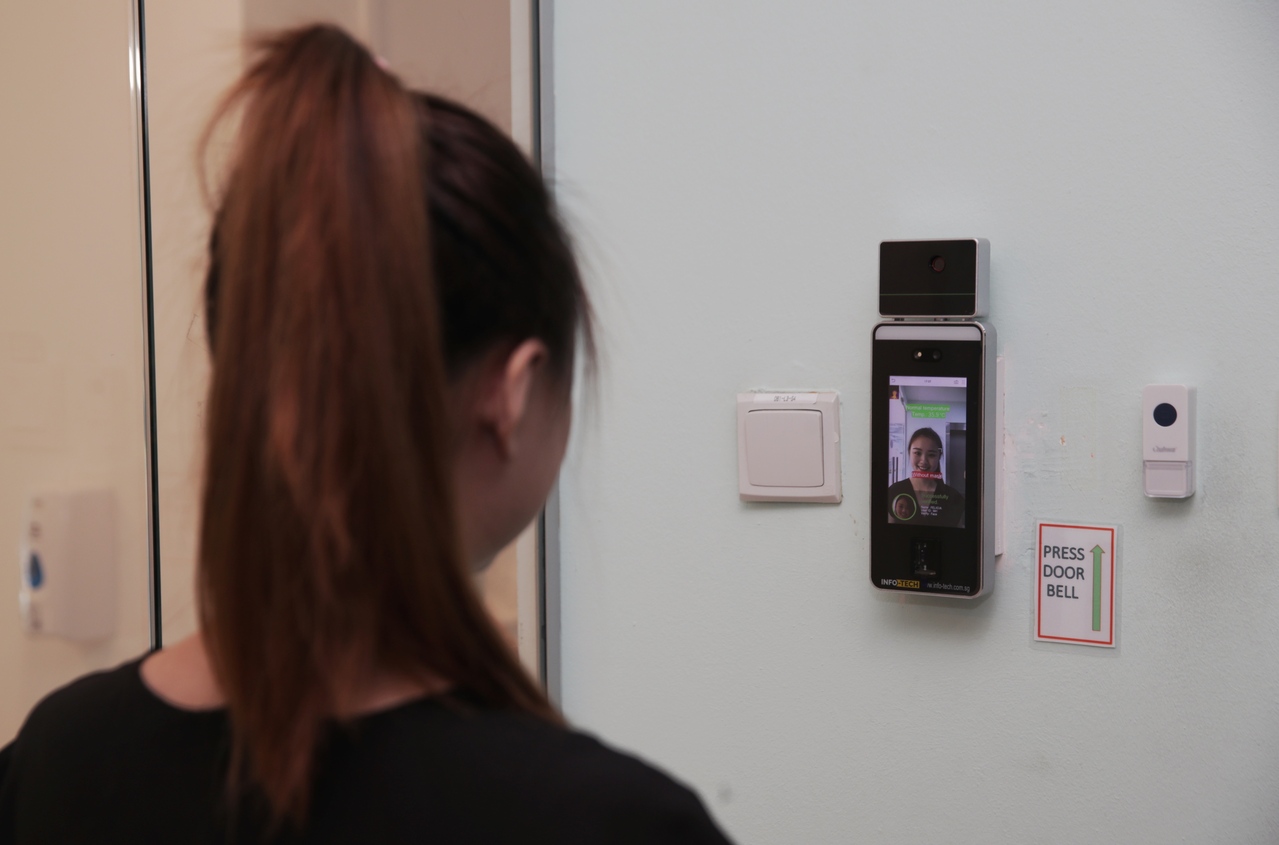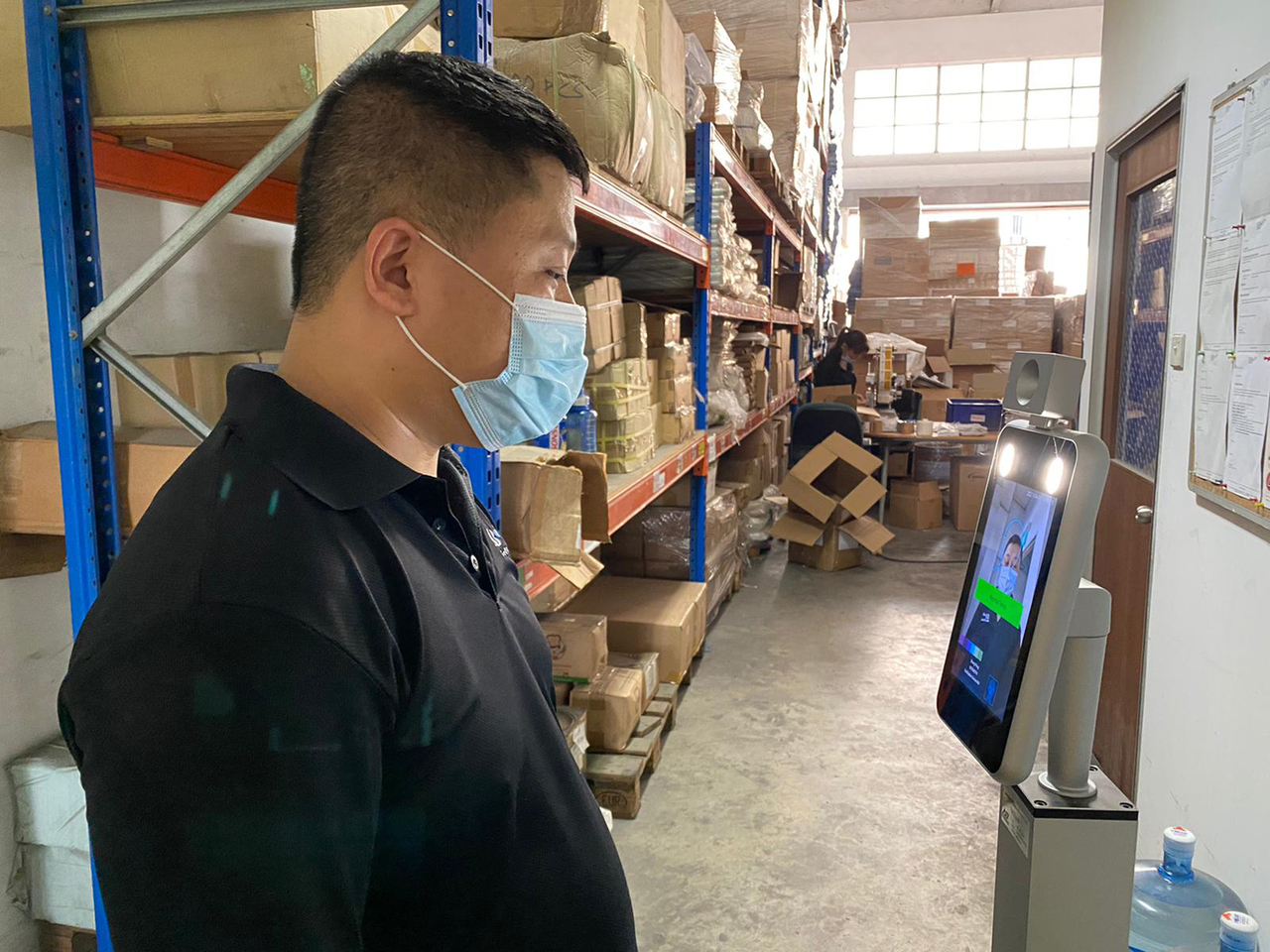Sales of facial-recognition devices that scan for temperature hit fever pitch in Singapore
Sign up now: Get ST's newsletters delivered to your inbox

A facial-recognition temperature scanner in use.
ST PHOTO: GIN TAY
Follow topic:
SINGAPORE - Software company LDR Technology was providing tech platform solutions for a travel mobile app when the Covid-19 pandemic hit, grounding airlines and all travel plans.
They switched to importing and selling facial-recognition temperature screeners, which saw a steep rise in demand.
Its business development manager Jimmy Lim said: "We saw a huge need for non-contact temperature scanners during phase one of the post-circuit breaker period, especially for those who still needed to return to the office. We thought it was the best opportunity to hit the market.
"When we had little income coming in, it not only provided solutions for our community, but also slightly eased our company's financial burden. Thanks to it, we were able to hold on to our jobs during the tough period and come this far."
These devices - usually comprising a screen the size of an iPad mini with a camera that scans an individual's face and temperature - have become a common sight in malls and office lobbies.
They cost between $2,000 and $5,000 each but companies are grabbing them, tapping government grants designed to get small and medium-sized enterprises (SMEs) to embrace digital solutions for work processes.
Technology company Info-Tech Systems Integrators was not selling such devices before May last year. But then the pandemic hit.
Last year, it sold 980 units of its facial-recognition temperature screeners and another 580 units in the first quarter of 2021.
"The sales of facial-recognition devices had risen gradually year on year but the demand for temperature screening increased dramatically due to the pandemic," said chief executive Dilip Babu.
Airboard Technology sold around 200 units last year to customers, including SMEs that utilised their Productivity Solutions Grant from the SMEs Go Digital programme to introduce technology in their offices.
Its senior manager Daphne Ong said: "This helps many Singapore SMEs to journey through a hard time by utilising tech into their business for continuity measures for Covid-19... It boosts their efficiency at the workplace and acts as a safety net for contact tracing, especially during the pandemic."
The firms selling these devices say they free up manpower and time needed to take the temperature of staff and visitors.
Since last November, Babilou Family Singapore has deployed 71 facial-recognition temperature scanners across the pre-schools and one student care centre it operates in 55 locations in Singapore.
"We were using a handheld thermometer for temperature scanning, but it was time-consuming and labour-intensive. With this face-recognition system, it allowed rapid contactless temperature-taking to monitor each employee and visitor's temperature before entry," said chief executive Julie Koh.

Packaging company AB PAC bought two units for its warehouse in Tuas South Avenue 1 after evaluating various options.
PHOTO: CATHERINE NG
While these devices are expensive, users say they were won over by their ease of use.
Packaging company AB PAC bought two units for its warehouse in Tuas South Avenue 1 after evaluating various options. Its human resource manager Catherine Ng said this is to improve productivity in temperature and attendance-taking of staff and visitors.
"Previously, we had to go through the hassle of taking the temperature for every person entering the premises and ensuring that they are wearing masks.
"With this device, everything is recorded automatically. We could free up the manpower needed to take the temperature measurement for visitors and these devices reduced human-to-human contact," she said.
The companies selling the devices expect to see continued strong sales.
Mr Babu believes sales at his firm will be up 15 per cent this year compared with last year.
He noted that customer inquiries have been pouring in since the announcement last month that up to 75 per cent of staff will be able to return to the workplace at any one time from April 5.
"As Covid-19 restrictions loosen up with more staff being able to return to the office, we expect temperature taking to be a new normal.
"Sales for these devices will continue to grow not only in the healthcare industry, but also in uses in public places like workplaces, schools, housing complexes and malls. It'll become a widespread staple of Covid-19 life," added Mr Babu.

